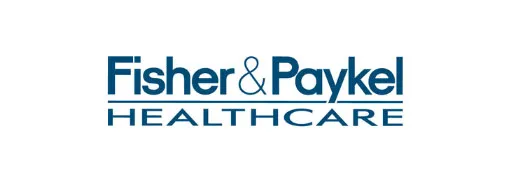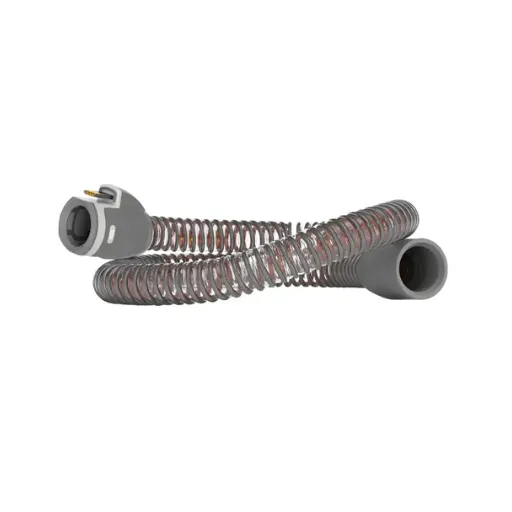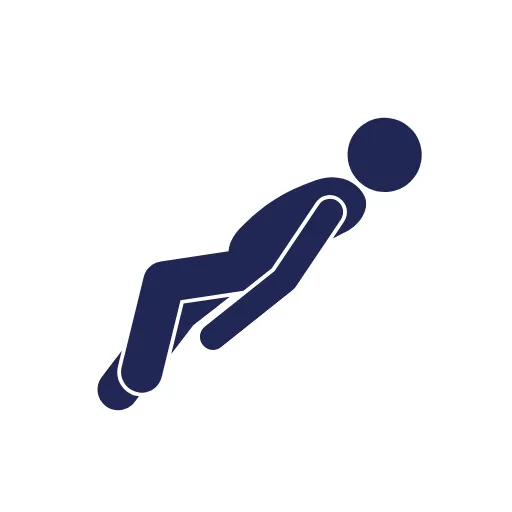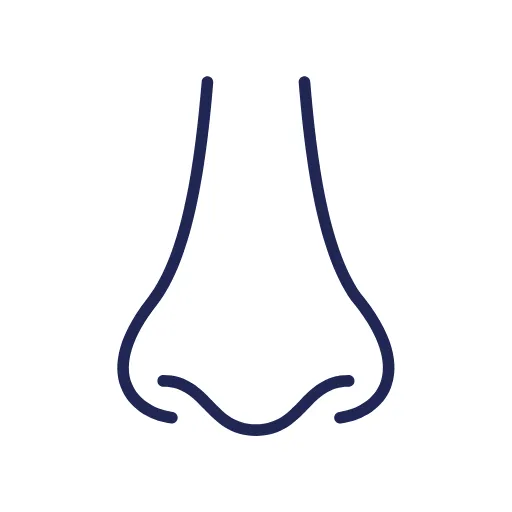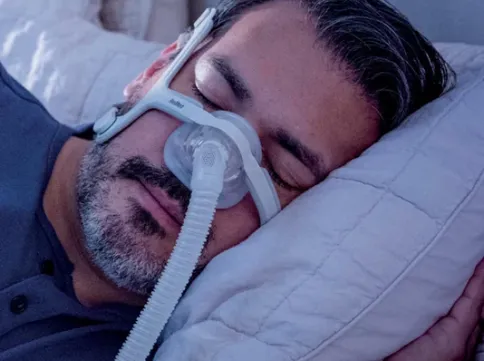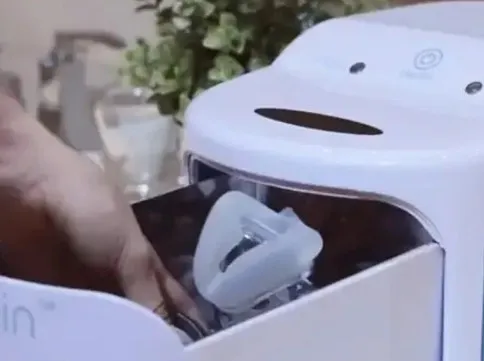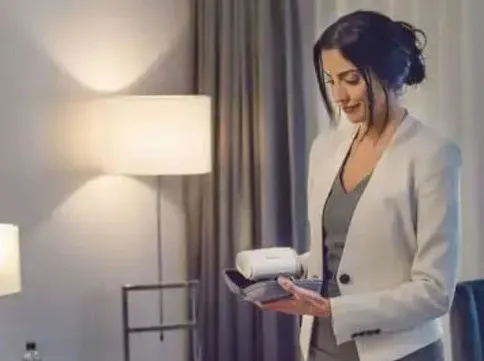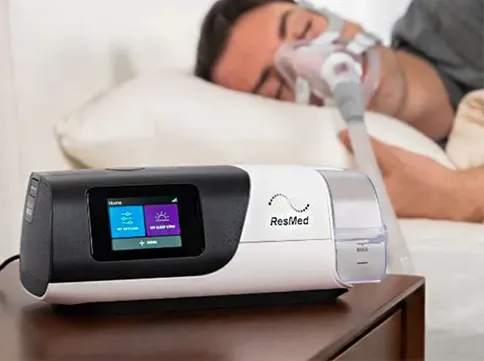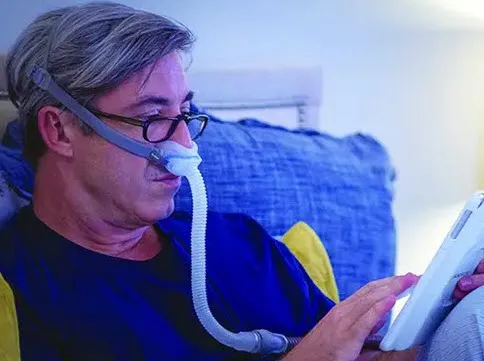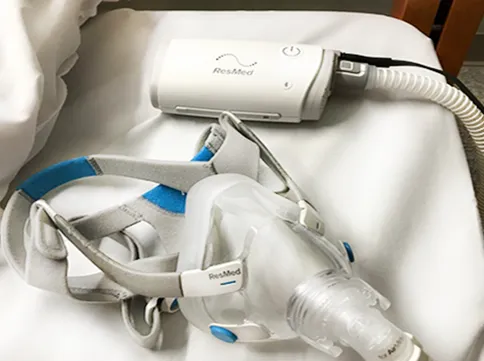We use cookies to make your experience better. To comply with the new e-Privacy directive, we need to ask for your consent to set the cookies. Cookies Policy.
Types of CPAP Machines


- Stands for “continuous positive airway pressure”
- Provides users with one constant pressure as they inhale while asleep to keep their airway open
- Equipped with several features and functions to help sleep apnea patients be comfortable at night
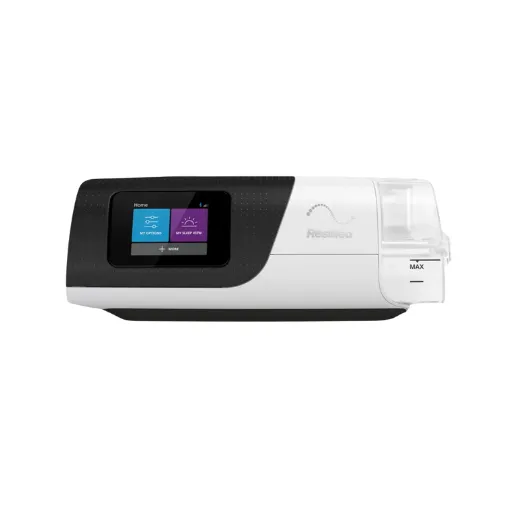

- Stands for “automatic positive airway pressure”
- Auto-adjusts to raise or lower the pressure based on the patient’s needs and breathing patterns
- Delivers only the minimum pressure needed to prevent the airway from collapsing, enhancing comfort during treatment


- Stands for “bi-level positive airway pressure”
- Delivers two separate pressures to the sleep apnea patients, one while they inhale and one while they exhale
- Most often offers a wider range of pressures, accommodating those who have more severe sleep apnea
Want to Know What CPAP Machine is Best For You?
MaskFit AR is our 3D face scanning capability, able to be done all from home! The CPAP Shop has partnered with MaskFit AR to offer hassle-free, personalized shopping recommendations. Simply answer some questions, scan your face, and we’ll help you find the best mask that fits your needs.
Features of a CPAP Machine
CPAP Machines vary in features, so it’s important to know which ones matter to you.
| Feature | Function |
|---|---|
| Noise Level | A typical CPAP machine operates at a noise level of 30 decibels, equivalent to the sound of a quiet library. While this is quiet for most users, light sleepers or bed partners may find it disruptive. For minimal noise, look for machines that operate at 30 dBa or less. |
| Design | Newer models are designed with a modern and sleek appearance. They include large buttons and user-friendly touchscreens, making them easy to operate. These machines are compact and sit nicely on a nightstand without taking up much space, blending into any bedroom environment. |
| Auto-Adjusting | Some machines feature an auto-adjusting mechanism that detects a user’s breathing pattern and makes real-time adjustments to deliver the most suitable pressure setting. This ensures optimal therapy for varying breathing needs during sleep. |
| Exhalation Relief | Known as EPR (Expiratory Pressure Relief), this feature reduces the air pressure a user experiences while exhaling. This makes exhalation easier and increases comfort during therapy. It is particularly useful for new users who are getting accustomed to CPAP therapy and those with higher pressure requirements. |
| AutoRamp | The AutoRamp feature starts CPAP therapy at a lower pressure than prescribed, making it easier to fall asleep. Once the machine detects that the user is asleep, it automatically increases the pressure to the prescribed level. This provides a smoother transition into therapy, particularly for those who find high pressure levels uncomfortable at bedtime. |
| Humidity | A CPAP humidifier adds moisture to the pressurized air, preventing dryness and irritation in the nasal passages and throat. The humidifier is a small tank that should be filled with distilled water. Moisturized air enhances comfort and can help alleviate issues like dry mouth and nosebleeds that may occur during therapy. |
| Sleep Tracking | Some CPAP machines are equipped with sleep tracking capabilities. They collect data on breathing patterns, sleep stages, and therapy usage. This information helps users and healthcare providers assess the effectiveness of the therapy and make necessary adjustments for improved sleep apnea management. |
| FAA-Approved | Certain CPAP devices, especially travel models, are approved by the FAA for use on airplanes and other forms of transportation. This ensures users can maintain therapy continuity while traveling, making these devices ideal for frequent flyers or those with travel requirements. |


Things to Consider When Choosing a CPAP Machine So You Know it’s Good for You
- What type of machine do I need?
- Which features (noise level, size, etc.) are important to me?
- Do I travel and need a portable machine, or should I buy one more geared toward home use?
- How do I get a CPAP prescription for therapy?
Skeptical of buying a CPAP machine Online? Don’t worry, The CPAP Shop has been a trusted medical supply retailer for over 20 years. Learn more about buying a CPAP machine online here.
CPAP Machine Brands
The CPAP Shop proudly offers CPAP machines from top-selling brands that excel in performance and comfort.
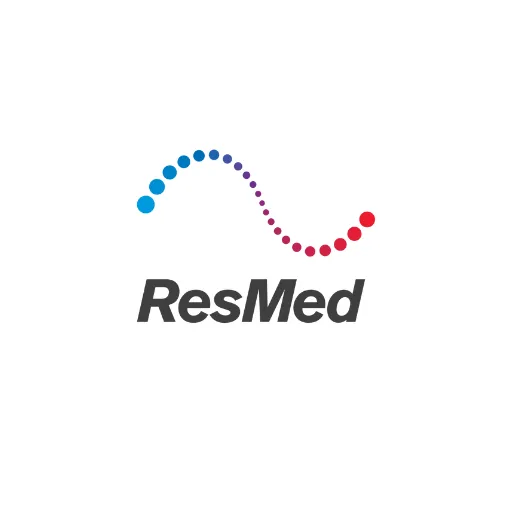

ResMed is a leading manufacturer in the CPAP industry, offering a range of cloud-connected devices that help patients manage their sleep apnea. They offer a range of CPAPs, BiPAPs, and travel machines to accommodate a range of CPAP users.


Resvent is a world leader in respiratory equipment, offering a CPAP machine product line, iBreeze, that is designed to help patients compliance with therapy.


React Health Medical is a trusted distributor and manufacturer of sleep therapy and oxygen therapy products. Its popular product line of Luna machines are available in both CPAP and BiPAPs. React Health is committed to empowering all sleep apnea patients to thrive in health and wellness.


Breas Medical is a leading manufacturer of medical equipment for sleep apnea treatment. Breas created and sells high-quality CPAP products that improve a person’s quality of life. They are committed to innovation and quality in all of their product offerings.


Although Fisher & Paykel Healthcare’s CPAP device is no longer sold in the US, its parts are still offfered at The CPAP Shop for those who continue to use this device. F&P’s expertly- designed parts help users have effective and comfortable CPAP therapy.


Resvent is a world leader in respiratory equipment, offering a CPAP machine product line, iBreeze, that is designed to help patients compliance with therapy.


Trascend’s mission is to deliver effective sleep apnea treatment in devices that are suitable for all CPAP users, including those who live active lifestyles with frquent travel plans and varying sleep locations.


Breas Medical is a leading manufacturer of medical equipment for sleep apnea treatment. Breas created and sells high-quality CPAP products that improve a person’s quality of life. They are committed to innovation and quality in all of their product offerings.
Popular CPAP Machine Accessories for the Best Possible Treatment


CPAP Cleaning Machines
CPAP Cleaning Machines and Sanitizers are engineered to clean the parts of a CPAP or BiPAP machine, effectively killing bacteria for safer, more compliant therapy.


CPAP Cleaning Supplies
Other supplies include CPAP cleaning wipes, cleaning solutions, and other accessories that encourage the proper sanitization of all CPAP products.


CPAP Filters
CPAP filters remove any dust, dander, or other particles from the air to allow CPAP users to breathe in clean, purified air during CPAP treatment.
Popular CPAP Masks for Every Lifestyle
Still Have Questions?
Our team at The CPAP Shop would be happy to help you!
Replacement Schedule of CPAP Machine Parts
- Cushions: every 3 months
- Headgear: every 6 months
- Filters: look at your
machine manufacturer’s
instructions - Humidifiers: every 6 months
- Tubing: every 90 days
- Machine: every 5 years
Cleaning and Maintenance of CPAP Equipment - The CPAP Shop
Daily cleaning and maintaining CPAP equipment is very important. This article by The CPAP Shop details how and
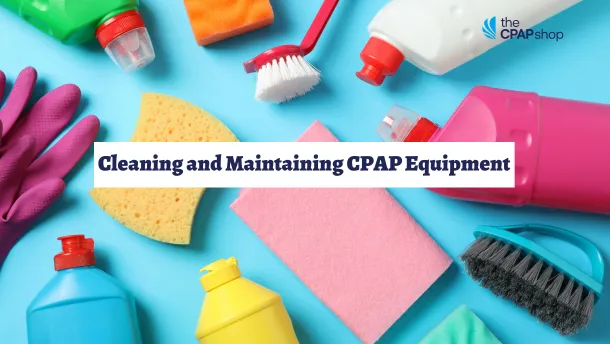

Latest CPAP Machine Videos
ResMed AirSense 11 AutoSet CPAP Machine Review
Showcasing product details, how to set it up, its unique features, and more
How to Set Up ResMed AirSense11
A detailed review for setting up this popular Resmed Machine
How to Connect Your AirMini to Bluetooth
Guided instructions to connecting this best-selling travel CPAP machine to Bluetooth.
Follow The CPAP Shop’s YouTube Page
Join our YouTube community! With 11,000 subscribers and counting, viewers of our page can watch CPAP tutorials,
product reviews, and learn tips and tricks to receive the best CPAP therapy possible.
11,770 +
Subscribers
190 +
Videos
5.3 Million
Views
Popular Articles about CPAP Machines


Best CPAP Machines of 2024
Compiled by our experts, reviewers, and customer ratings


CPAP Machine Troubleshooting Guide
Having trouble with your CPAP machine? Try these simple solutions.


Best Travel CPAPs Under $1,000
Find the best travel CPAP machines offered at an affordable price
CPAP Machine FAQs
For someone who has been diagnosed with sleep apnea, CPAP therapy is the most common and effective treatment option. A CPAP machine helps to keep a patient’s airways open throughout the night via a constant flow of pressurized air to prevent the throat from collapsing at night. The use of a CPAP machine reduces apnea events and allows users to breathe more easily.
A CPAP machine takes in the ambient air and pressurizes it according to the user’s prescribed setting. It then delivers the air via a CPAP tube and CPAP mask.
Yes, CPAP machines require a prescription prior to your purchase. Submitting a prescription to The CPAP Shop is simple! Check our our submittal page here.
At The CPAP Shop, we are determined to price our items as low as possible to give sleep apnea patients convenient access to the best CPAP products. While we do not accept insurance, we can provide an itemized receipt that you can independently submit to your insurance provider for potential reimbursement.
Once you take a sleep study to diagnose you with sleep apnea, your doctor will know what CPAP pressure to prescribe you with to see the best possible results. Once you are accustomed to your CPAP therapy, you will notice you are receiving better sleep, snoring less, are not as tired throughout the day, and more.
Yes, it is safe to buy the CPAP machines online if you are purchasing the product from a trusted online retailer like The CPAP Shop.
5 Common Concerns About Starting CPAP Therapy
Don’t sweat it! Starting CPAP therapy can be a big adjustment, so having questions and concerns is completely normal.
The CPAP Shop is here to help ease that transition. Here are 5 common concerns new CPAP users often have:
This is one of the most common questions we hear. New users often worry about claustrophobia and discomfort and whether they will be able to move around while sleeping. To combat these feelings, make sure the mask you choose fits properly to you, as that is crucial to successful CPAP therapy. If you can’t tolerate your mask, you won’t use the machine.
It’s very normal to want to know how long it’ll take to start seeing symptom and overall health improvements to make sure the time and effort of CPAP therapy is paying off. The good news is CPAP therapy can start working almost immediately, with some patients noticing improvements after only one night of treatment. However, it may also take up to 1-2 weeks to fully adjust and see the benefits of treatment. Managing those expectations and understanding the benefits of therapy (increased energy, mood, health, and much more!) can motivate you to stick with therapy. As with many things, consistency is key!
Dry mouth, nasal congestion, skin irritation, and swallowing air are all potential side effects that can worry new users. Addressing these concerns upfront allows you to learn about solutions and preventative measures, like using a humidifier (used to add moisture to the air for more comfortable therapy) and adjusting your CPAP mask to fit correctly on your face.
CPAP machines and masks require regular cleaning to prevent the build-up of germs an bacteria (that can cause infections) and ensure proper function. This can feel overwhelming at first having to stick to a new routine, but patients will quickly learn that proper cleaning is essential for your health and the longevity of your equipment. A clear understanding of the process will make it less daunting.
CPAP therapy is a long-term commitment, and you will need to figure out how to integrate it into your daily life and social situations to see optimal results. Thankfully, CPAP products vary in size, noise level, and design to accommodate users whether they are traveling, sharing a bed with their partner, and more. Addressing your specific lifestyle habits and concerns can help you develop strategies for managing CPAP use in various situations, leading to greater adherence and overall success.












